Texas Bar Examination
The Texas Bar Examination is a gateway through which all the specific career pathways must pass, so all Texas law students should pay at least some attention to the subjects tested on the Texas Bar Examination when planning their law school curricula.
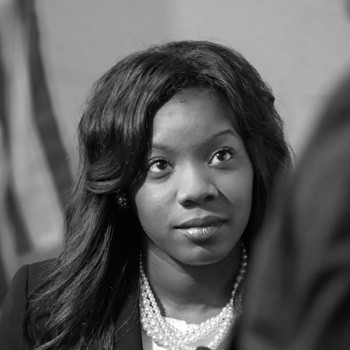
Introduction
Welcome to the Texas Bar Examination Pathway! This Pathway differs from other Pathways in that preparing for the bar exam is not in itself preparing for any particular legal career. Taking and passing the bar exam is not an end in itself, and no one attends law school just to pass the bar exam. Nevertheless, all law students planning to practice law in Texas must take and pass the Texas Bar Examination. In this respect, the Texas Bar Examination is a gateway through which all the specific career Pathways must pass, so all Texas law students should pay at least some attention to the subjects tested on the Texas Bar Examination when planning their law school curricula. You therefore should take into account the information provided here concerning curriculum planning and the Texas Bar Examination and integrate that information with the recommendations provided for the particular Career Pathway in which you have an interest.
Quick Links
With some planning, diligence, and confidence in your abilities, you can pass the bar exam! You already are off to a great start as a South Texas College of Law Houston student, because the law school provides many resources to assist you study for the bar exam.
Curriculum
The South Texas College of Law Houston curriculum is structured to allow every student to take courses corresponding with the subjects tested on the Texas Bar Examination. Moreover, the content of those courses is designed to teach the knowledge and skills both to qualify you for the practice of law in Texas and to get you ready to take the bar exam.
Bar PreView
You may take the Bar PreView course in your last semester of enrollment. This course, required for some students but open to all, allows you to lengthen your time preparing for the bar exam by reviewing some of the key material tested on the bar exam and by giving you an opportunity to practice the skills essential for success on that exam.
BARBRI Discount
BARBRI is the leading provider of bar exam preparation courses in the nation, and the law school has an arrangement with BARBRI allowing all graduates to take the BARBRI bar prep course at a substantially discounted price.
Bar Review Workshops
After you graduate and while you are studying for the bar exam, the law school’s Office of Academic Success and Professional Achievement offers a series of workshops that parallel and support your bar exam preparation by teaching test-taking skills and strategies specific to the bar exam and by providing many opportunities to practice those skills and to receive feedback on your work.
The next section describes the format and content of the Texas Bar Exam effective with its February 2021 administration.
What To Expect on the Texas Bar Examination
A. Overview
Effective with the February 2021 administration, the Texas Supreme Court has adopted as the Texas Bar Examination the Uniform Bar Examination (UBE) produced by the National Conference of Bar Examiners (NCBE). Each year, the UBE is administered during the last Tuesday and Wednesday in February and the last Tuesday and Wednesday in July.
The UBE has three parts: (1) the Multistate Bar Examination (MBE), (2) the Multistate Essay Examination (MEE), and (3) the Multistate Performance Test (MPT). The highest possible scaled score over these three parts is 400, and a test-taker must achieve a scaled score of 270 or higher to pass in Texas. The relative weights of the three parts of the UBE are as follows:
- The Multistate Bar Examination (MBE) 50%
- The Multistate Essay Examination (MEE) 30%
- The Multistate Performance Test (MPT) 20%
The Texas Board of Law Examiners (BLE) supervises the administration and grading of the Texas bar examination. The BLE instructs examinees to be in their assigned seats by 8:30 a.m. for each morning session and by 1:30 p.m. for each afternoon session. The actual timed testing session begins immediately after the conclusion of the instructions. The BLE will not grant additional time to anyone arriving late, and once instructions begin, examinees are expected to remain seated and quiet. We therefore very strongly recommend that you plan to arrive at the examination site early enough to take care of any needs you may have and can enter the testing room and be present when instructions and testing begin.
B. Tuesday – Multistate Essay Exam and Multistate Performance Test
The first day of the Texas Bar Exam consists of two different kinds of test – the Multistate Essay Examination and the Multistate Performance Test. The total testing time for these two parts is six hours, three hours in the morning session and three hours in the afternoon session; but you should expect the testing day to take about seven hours, including time for proctoring instructions and exam collection.
- Multistate Essay Examination: 3 Hours, 6 Essay Questions – 30% of score
The MEE consists of six 30-minute essay questions. The subjects that may be covered include Business Associations (including Agency and Partnership, Corporations, and Limited Liability Companies), Civil Procedure, Conflict of Laws, Constitutional Law, Contracts (including Article 2 [Sales] of the Uniform Commercial Code), Criminal Law and Procedure, Evidence, Family Law, Real Property, Torts, Trusts and Estates (including Decedents’ Estates, Trusts, and Future Interests), and Article 9 (Secured Transactions) of the Uniform Commercial Code. The specific subjects covered vary from exam to exam, and some questions may include issues in more than one area of law. The NCBE advises examinees that they should analyze MEE questions using generally accepted legal principles rather than local statutory or case law.
The NCBE’s instructions for answering MEE questions state that test-takers should demonstrate their ability to reason and analyze. Successful essay answers must show an understanding of the facts (so it is important to read questions carefully), a recognition of the issues presented by the facts, knowledge of the applicable legal principles, and the reasoning leading to a conclusion. Identifying the legal issues raised in the facts, adducing the law relevant to those issues, and showing how that law applies to the facts of the problem are more important than the conclusions you reach. The NCBE emphasizes that, while clarity and concision are important, answers should be complete. It also advises that essay writers not volunteer irrelevant or immaterial information.
You can obtain more information about the MEE, including outlines of the tested subject matter for each MEE subject and samples of past MEE questions, from the NCBE website: https://www.ncbex.org/exams/mee/preparing/ - The Multistate Performance Test (MPT): 3 Hours, 2 Items – 20% of score
The MPT consists of two 90-minute problems. It is intended to test your ability to use basic lawyering skills to complete a task that a beginning lawyer should be able to accomplish. Among the lawyering tasks you might be called upon to perform are any of the following: a legal memorandum to a supervising attorney, a letter to a client, a persuasive memorandum or brief, a statement of facts, a contract provision, a will, a counseling plan, a proposal for settlement or agreement, a discovery plan, a witness examination plan, or a closing argument.
Each MPT problem will include a “File” and a “Library.” The File consists of a memorandum from a supervising attorney providing the specific assignment you are to complete; it also includes the source documents containing the facts relating to the problem. Those source documents might include transcripts of interviews, depositions, hearings, or trials; pleadings; correspondence; client documents; contracts; newspaper articles; medical records; police reports; or lawyer’s notes. The facts are sometimes ambiguous, incomplete, or even conflicting. You also may receive irrelevant as well as relevant facts.
The Library may contain cases, statutes, regulations, or rules, some of which may not be relevant to the assigned lawyering task. You are expected to identify from the Library the legal principles necessary to analyze the problem and perform the assigned task. The MPT does not test your prior knowledge of the substantive law. Instead, the Library materials provide sufficient substantive information to complete the task.
You can obtain more information about the MPT, including samples of past MPT questions, from the NCBE website: https://www.ncbex.org/exams/mpt/preparing/
C. Wednesday – Multistate Bar Examination (MBE): 6 Hours, 200 Multiple-Choice Questions – 50% of score
The second day of the bar exam comprises the Multistate Bar Examination (MBE). The MBE consists of 200 multiple-choice questions, 175 of which are scored. The 175 scored questions include 25 questions from each of the following seven subject areas: Civil Procedure, Constitutional Law, Contracts, Criminal Law and Criminal Procedure, Evidence, Real Property, and Torts. The 25 unscored questions are field-test items and are indistinguishable from the scored items, so you should answer all 200 questions.
The MBE is administered over a morning and an afternoon testing session. The actual testing time is 6 hours (3 hours in the morning and 3 hours in the afternoon, with a lunch break in between), but you should expect the exam to take about eight or nine hours, including the time for the proctor’s instructions and for exam collection. You will receive 100 questions during the 3-hour morning session and 100 questions during the 3-hour afternoon session. Thus, examinees have an average of 1.8 minutes (or 1 minute, 48 seconds) to answer each question.
The MBE is intended to assess the extent to which you are able to apply fundamental legal principles and reasoning to evaluate the legal issue presented in the given fact patterns. Each MBE question is followed by four possible answers. The NCBE instructs examinees to choose the best answer from the four stated alternatives. MBE questions are designed to be answered according to generally accepted legal principles, unless a particular question directs otherwise. You should mark only one answer for each question, because multiple answers are scored as incorrect. Moreover, scores are based on the number of questions answered correctly – there is no deduction for wrong answers – so you are advised to answer every question.
The MBE does not segregate questions by subject, nor do the questions explicitly indicate their subject matter. You can obtain more information about the MBE, including an MBE subject matter outline and sample MBE questions, from the NCBE website: https://www.ncbex.org/exams/mbe/preparing/
D. The Texas Law Component
Rules 2(a)(8) and 5 of the Rules Governing Admission to the Bar of Texas requires anyone passing the UBE given in Texas in or after February 2021 to satisfy the Texas Law Component before being admitted to practice in Texas. An applicant for admission will satisfy that requirement by taking the Texas Law Course (TLC). The TLC consists of a series of online video lectures given by experienced Texas lawyers. Applicants may complete the TLC up to one year before taking a bar exam and up to two years after passing a bar exam in Texas.
Applicants complete the TLC by viewing a series of online lectures and answering several “hurdle questions” at the end of each segment. The purpose of the hurdle questions is to assess whether the applicant has a minimal level of comprehension of the material covered in that segment. As the Texas Board of Law Examiners describes them, the hurdle questions are not intended to be tricky, difficult, or hard. It advises that applicants can successfully answer the hurdle questions if they pay careful attention to the lectures and take notes as they view them. An applicant must correctly answer most of the hurdle questions for each segment before being permitted to proceed to the next segment. The total length of the video presentations is approximately 12 hours.
You will take the TLC through the State Bar of Texas – TexasBarCLE. There is no charge for the course, but you must register as a user of TexasBarCLE before you can register for the TLC. You can get more information about the TLC and how to register for it from the Texas Board of Law Examiners FAQ page: https://ble.texas.gov/faq
Transferability of Uniform Bar Examination Scores
The Texas Supreme Court adopted the UBE as the assessment of competency to practice law in Texas in part because UBE scores are transferable. Jurisdictions that have adopted the UBE will accept transferred scores that meet their own passing standards regardless of whether the test-taker’s score meets the passing standard in the testing jurisdiction. A law school graduate who takes the UBE may report his or her UBE score to any other UBE jurisdiction, and that jurisdiction will honor it. Provided the examinee’s UBE score is at or above that jurisdiction’s cut score, the examinee can be admitted to practice in that jurisdiction. Passing scores in UBE jurisdictions range from 260 to 280.
The transferability of UBE scores makes it possible for a Texas law school graduate to take and pass the Texas Bar Examination and be admitted to practice both in Texas and in any other UBE jurisdiction where his or her UBE score satisfies that state’s passing score. Similarly, a Texas law school graduate who takes the Texas Bar Examination and receives a score below the 270 required in Texas may still be admitted to practice in another UBE jurisdiction having a lower passing score. Of course, anyone seeking to be admitted to practice law in any jurisdiction must meet the character and fitness requirements of that jurisdiction.
The UBE thus allows lawyers to be admitted to practice in multiple states without spending the time and money needed to take multiple bar exams. This can be advantageous for a new law school graduate who wishes to look for employment in more than one state, including both Texans who wish to be admitted in other states and non-Texans who wish to practice in Texas. The UBE is also beneficial for lawyers whose law practice involves matters in more than one state, an increasingly common feature of modern law practice. Oil and gas lawyers, for example, often represent clients with assets located in multiple oil- and gas-producing states; and Texas, Oklahoma, New Mexico, Colorado, and North Dakota are all UBE states.
Because of the flexibility the UBE affords, some students may wish to consider options the UBE provides. Depending upon their personal circumstances, some students may find it advantageous to take the UBE and apply for admission to practice in other states either in lieu of or in addition to Texas, while others may find it better for them to take the UBE in another state and seek admission there, in Texas, or both. The NCBE website shows the jurisdictions that have adopted the UBE and their passing scores. See http://www.ncbex.org/exams/ube/score-portability/minimum-scores/
About the Multistate Professional Responsibility Exam
Rule V of the Rules of the Supreme Court of Texas Governing Admission to the Bar of Texas provides as follows:
No Applicant for admission to the Texas Bar shall be issued a license to practice law in Texas until such person has furnished to the Board evidence that (s)he has passed the Multistate Professional Responsibility Examination (MPRE) with a scaled score of 85.
The Multistate Professional Responsibility Examination (MPRE) is a sixty-question, two-hour, multiple-choice examination administered three times each year – in March, August, and November. The test consists of fifty scored questions and ten field-test questions that are not scored. The field-test questions are indistinguishable from the scored questions, so examinees should answer all the questions presented on the test. The MPRE is required for bar applicants in all but two states – Maryland and Wisconsin.
The National Conference of Bar Examiners (NCBE) drafts the MPRE. The exam is designed to measure the examinee’s knowledge and understanding of established legal standards governing an attorney’s professional conduct, not to assess an individual’s personal ethical values. Questions dealing with the disciplinary rules of professional conduct will be governed by the American Bar Association (ABA) Model Rules of Professional Conduct. Test questions covering judicial ethics apply the current ABA Model Code of Judicial Conduct. The remaining questions, outside the disciplinary context, are designed to measure an understanding of the generally accepted rules, principles, and common law regulating the legal profession in the United States. On these questions, the correct answer will be governed by the view reflected in a majority of cases, statutes, or regulations on the subject. To the extent that Texas law varies from the model rules, it is not covered by the examination. The NCBE publishes an MPRE Subject Matter Outline describing the MPRE’s scope of coverage and the approximate percentage of items that are included in each major area.
Each MPRE question describes a factual scenario along with a specific question and four possible answers. The MPRE directs examinees to choose the best answer from the four stated options. The examinee should mark only one answer for each question, because multiple answers are scored as incorrect. Since scores are based on the number of questions answered correctly, it is advisable for test-takers to answer every question. If a question seems too difficult, the NCBE recommends that you go on to the next question and come back to the skipped question later. The NCBE also publishes the MPRE Sample Test Questions for examples of test questions similar to those on the MPRE. You can obtain more information about the MPRE on the NCBE website: http://www.ncbex.org/exams/mpt/preparing
South Texas has only preliminary data on student performance on the MPRE, but that data suggests that students who have completed the required law school Professional Responsibility course prior to taking the MPRE perform better on the test than those who take the MPRE without first taking the Professional Responsibility course and those who take the MPRE while contemporaneously enrolled in the Professional Responsibility course.
The information provided here is organized differently than it is in the other Pathways, because students should determine the sequencing of their elective courses as a function of their intended law practice goals. Thus, they should be guided by the relevant Career Pathway in deciding the sequence in which they take courses. There is, therefore, no one-size-fits-all order in which students should take courses related to the Texas Bar Examination. For example, a student preparing for an estate planning practice may choose to take Wills, Trusts, and Estates during his or her second (full-time) year of law school in order to be prepared to take the Estate and Gift Tax and Estate Planning courses during the third (full-time) year, while a student preparing for a career doing business transactional work may choose to take Corporations and Secured Transactions in his or her second (full-time) year in order to take one of the Capstone Transactional Skills courses in the third (full-time) year.
Accordingly, the following tables identify the specific subjects tested on the Texas Bar Examination and show the corresponding courses offered at South Texas College of Law, indicating whether they are Required or Elective courses. The bar exam subjects are organized by the day on which they are examined on the Texas Bar Examination. So, for example, the South Texas courses correlated with subjects tested on the Multistate Bar Examination appear in the table for Wednesday.
You will observe that the South Texas College of Law Houston courses related to the subjects tested on both the Multistate Bar Examination and the Multistate Professional Responsibility Examination are all part of the required law school curriculum. In addition, all the courses corresponding with subjects tested on the Multistate Essay Examination (except for Conflict of Laws) also are a part of the required law school curriculum, although full-time students whose cumulative GPA is 3.000 or higher immediately after having attempted 30 credit hours or having completed 2 semesters, whichever occurs first, and part-time students whose cumulative GPA is 3.000 or higher immediately after having attempted 30 semester hours or having completed 4 semesters or sessions, whichever occurs first, may elect not to take one or more of the following courses: Agency & Partnership; Corporations; Family Law; Secured Transactions; and Wills, Trusts, & Estates. Nevertheless, the faculty strongly recommends that all students take each of these courses, even if they are eligible to opt out of doing so, because of their importance to law practice and their relevance to the Texas Bar Examination.
| Subjects Tested | |
| Related South Texas Course(s) |
Multistate Professional Responsibility Examination
Subjects Tested
Professional Responsibility and Judicial Conduct
50 multiple-choice questions
Related South Texas Course(s)
PROFESSIONAL RESPONSIBILITY (Required)
Tuesday – The Multistate Performance Test
Subjects Tested
Multistate Performance Test (MPT)
Preparation of an assigned lawyer work product
Related South Texas Course(s)
Legal Research & Writing I (Required)
Legal Research & Writing II (Required)
Tuesday – The Multistate Essay Examination
Subjects Tested
Business Associations
Essay
Related South Texas Course(s)
Agency & Partnership (Required)
Corporations (Required)
Subjects Tested
Conflict of Laws
Essay
Related South Texas Course(s)
Conflict of Laws (Elective)
Subjects Tested
Family Law
Essay
Related South Texas Course(s)
Family Law (Required)
Subjects Tested
Trusts and Estates
Essay
Related South Texas Course(s)
Wills, Trusts & Estates (Required)
Subjects Tested
Secured Transactions
Essay
Related South Texas Course(s)
Secured Transactions (Required)
Subjects Tested
All Multistate Bar Examination (MBE) Subjects
Essay (See Wednesday for MBE-related Questions)
Related South Texas Course(s)
Wednesday – Multistate Bar Examination Subjects
Subjects Tested
Civil Procedure
25 multiple-choice questions
Related South Texas Course(s)
Civil Procedure I (Required)
Civil Procedure II (Required)
Subjects Tested
Constitutional Law
25 multiple-choice questions
Related South Texas Course(s)
Constitutional Law (Required)
First Amendment Law (Required)
Subjects Tested
Contracts
25 multiple-choice questions
Related South Texas Course(s)
Contracts I (Required)
Contracts II (Required)
Subjects Tested
Criminal Law & Criminal Procedure
25 multiple-choice questions
Related South Texas Course(s)
Criminal Law (Required)
Criminal Procedure (Required)
Subjects Tested
Evidence
25 multiple-choice questions
Related South Texas Course(s)
Evidence (Required)
Subjects Tested
Real Property
25 multiple-choice questions
Related South Texas Course(s)
Property I (Required)
Property II (Required)
Subjects Tested
Torts
25 multiple-choice questions
Related South Texas Course(s)
Torts I (Required)
Torts II (Required)
*Because taxation and bankruptcy are tested only as crossover topics on the Texas Bar Examination, students should consider taking these elective courses if they contribute to their career pathway preparation but should not do so solely as preparation for the bar examination.
South Texas College of Law Houston
Exam-Taking Assistance
The Office of Academic Success & Professional Achievement can provide assistance for South Texas College of Law Houston students or alumni preparing to take the Texas Bar Examination.
Programs
Bar Preview: This two-credit study skills course is open to all STCL Houston students in their last semester of enrollment. For a description of the course, students can log in to their STANLEY accounts and go to: Registrar → Bar Exam → Supplemental Texas Bar Examination Information → Studying for the Bar Exam–South Texas College of Law Houston Resources.
Supplemental Bar Review: These free bar review courses are taught by STCL Houston faculty and are also offered free of charge to alumni. They take place approximately three to four weeks before each administration of the Texas Bar Examination. For a description of the program, students will need to log in to their STANLEY accounts and go to: Registrar → Bar Exam → Supplemental Texas Bar Examination Information → Studying for the Bar Exam–South Texas College of Law Houston Resources.
Texas Board of Law Examiners
The Texas Board of Bar Examiners (BLE) is the state judicial agency charged with determining whether applicants seeking admission to practice law in Texas meet the requirements established by the Texas Supreme Court. All law students who plan to practice in Texas should consult the BLE website; it contains information essential for anyone applying for admission to practice in Texas.
- Texas BLE Website
- Rules Governing Admission
- Bar Examination Information (including past questions and sample answers)
National Conference of Bar Examiners
The National Conference of Bar Examiners (NCBE) is a non-profit organization founded in 1931. Its mission includes producing uniform and standardized examinations for testing the competency of applicants for admission to practice law. Texas makes use of the Multistate Professional Responsibility Exam (MPRE), Multistate Performance Test (MPT), and the Multistate Bar Examination (MBE), all of which are administered by the NCBE.
The NCBE website provides information about each of the exams. It also provides access to some sample exams.
- MPRE Information: http://www.ncbex.org/about-ncbe-exams/mpre/
- MPRE Practice Exams: http://store.ncbex.org/mpre/
- MPT Information: https://www.ncbex.org/exams/mpt/about-mpt
- MPT Sample Exams: http://store.ncbex.org/mpt/
- MBE Information: http://www.ncbex.org/about-ncbe-exams/mbe/
- MBE Practice Exams: http://store.ncbex.org/mbe/
Commercial Bar Preparation Courses
STCL Houston does not endorse any particular commercial bar preparation course. Nevertheless, the law school has evaluated bar exam performance data for many years, and it is clear that those students who enroll in a commercial bar review course on average perform better than those who do not do so. The law school encourages every student to examine what each of the commercial bar review courses provides to determine which one provides the combination of products, services, and price that best meets his or her needs.
Popular Comprehensive Courses
There are four popular providers that offer comprehensive bar preparation courses in Texas. These courses include coverage of those subjects tested on the Multistate Bar Examination (MBE) as well as the Texas-specific content tested on the Texas Bar Examination.
BARBRI – BARBRI offers both live lectures in a physical location at a pre-scheduled time as well as online, on-demand video lectures. The course includes written outlines, simulated bar exams, and exam-writing workshops. For information, visit http://www.barbri.com/ or call 1-800-937-2778.
Kaplan Bar Review – Kaplan offers lectures in a physical location at a pre-scheduled time. Some lectures are delivered by a live lecturer or by a live lecture via simulcast. Lectures also are available online. For information, visit http://www.kaptest.com/Bar-Exam/Home/index.html or call 1-800-523-0777.
Reed Bar Review – Reed Bar Review offers both personalized one-on-one coaching and self-study bar review services. For information, visit www.reedbarreview.com or call 1-800-852-3926.
Themis Bar Review – The Themis Bar Review course is offered in an exclusively online and on-demand format. Students may use a directed study approach, providing a structured and sequential set of daily tasks to be completed in order, or a flex-study approach, allowing those who choose to study at their own pace. For information, visit https://www.themisbar.com/pass-the-bar-exam/texas-bar-exam or call 1-888-843-6476.
Other Courses
STCL Houston is aware of other commercial bar preparation providers. Some offer more limited courses, typically covering only the MBE portion of the bar exam, while others offer private tutorial services.
AdaptiBar (MBE only)
http://www.adaptibar.com/why-adaptibar.aspx
1-877-466-1250
Ameribar.com (comprehensive)
http://ameribar.com/texas-bar-review-course/
1-800-529-2651
Bar Exam Doctor (comprehensive)
http://www.barexamdoctor.com/index.php
1-818-922-5151
Celebration Bar Review (comprehensive)
http://www.celebrationbarreview.com/texas-bar-review/
1-888-720-0010
Southwest Bar Review (comprehensive, one-on-one tutoring)
http://southwestbarreview.com/
Supreme Bar Review (MBE, MPT, and MPRE)
http://supremebarreview.com/
1-216-696-2428
Bar Review Books and Study Aids
Below you will find links to a number of bar review books, study aids, and survival guides that some students may find helpful when preparing to take the bar exam. The books below are organized by author, in alphabetical order. The call numbers are provided for the materials held in the Fred Parks Law Library collection.
NOTE: The content covered and emphasis given to subjects tested on the Texas Bar Examination changes from time to time, so the materials supplied to you by your commercial bar review course provider is likely to be the most current study materials available. Accordingly, you should use them as your primary study aids for the content and the scope of the administration of the Bar Exam for which you have registered.
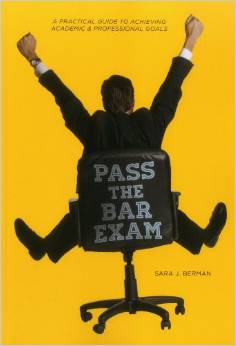
Pass the Bar Exam: A Practical Guide to Achieving Academic and Professional Goals
Berman, Sara J.
Chicago: American Bar Association (2013)
KF303 .B45 2013
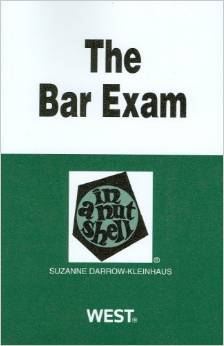
The Bar Exam in a Nutshell
Darrow-Kleinhaus, Suzanne
St. Paul, MN: West (2009)
KF303 .D37 2009
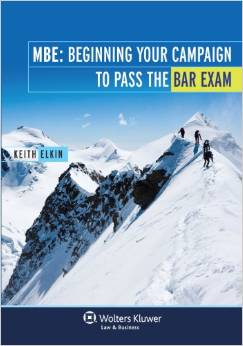
MBE: Beginning Your Campaign to Pass the Bar Exam
MBE: Beginning Your Campaign to Pass the Bar Exam
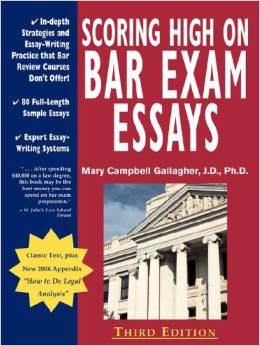
Scoring High on Bar Exam Essays
Gallagher, Mary Campbell
New York: Sultzburger and Graham Pub. (1996)
KF303 .G35 1996
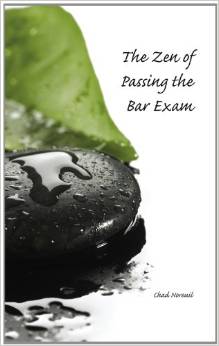
The Zen of Passing the Bar Exam
Noreuil, Chad
Durham, NC: Carolina Academic Press (2011)
KF303 .N673 2011
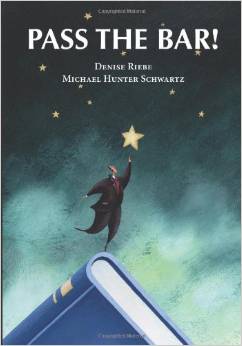
Pass the Bar!
Riebe, Denise and Schwartz, Michael Hunter
Durham, NC: Carolina Academic Press (2006)
KF303 .R54 2006

